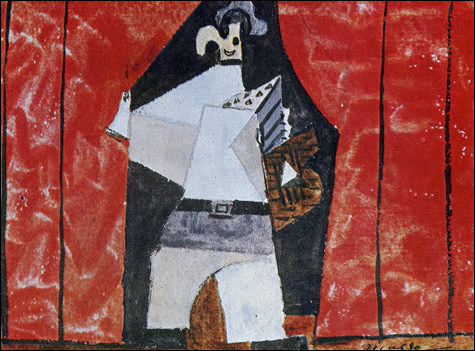Notes from 'Ballets Russes 2009'
By JEFFREY GANTZ | January 14, 2010

PULCINELLA (1920) Imagine having Picasso to do your curtain design. |
The 100th birthday of Serge Diaghilev's Ballets Russes — which flourished in (mostly) Paris and London but also toured to cities that included New York — prompted the expected centennial tributes in Boston: a "Diaghilev's Ballets Russes 1909–1929: Twenty Years That Changed the World of Art" symposium and exhibition at Harvard University in April, and a "Ballets Russes 2009" festival this month that centered on a conference at Boston University but also included a Ballets Russes program from Boston Ballet (my review was in the May 22 Phoenix), a selection of films at the Museum of Fine Arts, Ballets Russes nights from the Boston Pops and the New England Conservatory Youth Philharmonic, an homage to Feodor Chaliapin at BU Concert Hall, and shows at BU's 808 Gallery and the Wadsworth Atheneum in Hartford. What was less expected, perhaps, was the reminder emerging out of all this that Diaghilev and the Ballets Russes did change the world, and not just in the company's 20 years of existence. What exists today as dance, and as art (Picasso, Matisse, Gris, Braque, and Rouault all designed for Diaghilev), would be very different without them.Here are some notes from "Ballets Russes 2009."
The movie
BU's "The Spirit of Diaghilev" conference opened with a movie screening, a 1968 Diaghilev documentary from the BBC and Bavarian TV that's not available on video. The two-hour film was presented by Bob Lockyer, who produced along with John Drummond. It's narrated by Peter Ustinov, who turns out to be a grandnephew of one of Diaghilev's original designers, Alexandre Benois, and thus more than just a celebrity talking head.
You could think of Diaghilev as a prequel to the invaluable 2005 Ballets Russes documentary, which starts with Diaghilev's death. We get reminiscences from dancers including Tamara Karsavina (Diaghilev's original Firebird, opposite Vaslav Nijinsky), Lydia Sokolova (the Chosen One in Léonide Massine's 1920 reworking of Le Sacre du Printemps), Marie Rambert (who worked with Diaghilev and Nijinsky on the original Sacre), Massine (who took over Nijinsky's dance roles and became one of the century's leading choreographers), Ninette de Valois (who went on to found what would become the Royal Ballet), and Serge Lifar (the original Prodigal in George Balanchine's Prodigal Son, he went on to head the Paris Opera Ballet for nearly 30 years). Sokolova's pronounced British accent might puzzle you if you didn't know (something the film doesn't reveal) that she started out life as Hilda Munnings — as his supply of actual Russian dancers began to run out, Diaghilev would "nationalize" his English dancers, so that Lilian Alicia Marks became Alicia Markova and Sydney Francis Patrick Healey-Kay turned into Anton Dolin.
 Related
Related:
2009: The year in dance, Documentary Man, Reality riffs, More 
- 2009: The year in dance
You could say there were two tremendous forces that propelled dance into the world of modern culture: the Ballets Russes of Serge Diaghilev and the choreography of Merce Cunningham.
- Documentary Man
If you think the polemic salvos Michael Moore churns out define the modern documentary, you've either succumbed to Moore's manipulative shenanigans or are unfamiliar with the works of Frederick Wiseman. No disrespect to the Roger & Me director, he is what he is — a man with a camera and a handful of pixie dust.
- Reality riffs
When Jerome Robbins's New York Export: Opus Jazz boogied onto the scene in 1958 then took Europe by storm. Created for Ballets: U.S.A., a company of ballet, modern, and jazz dancers that Robbins had put together for a government-sponsored cultural exchange tour, Opus Jazz was a kind of spinoff from the 1957 hit musical West Side Story , which Robbins directed and choreographed.
- Here’s looking at you
Set in the usual small village — this one in the Carpathian Mountains of Eastern Europe — Coppélia might look like just another pleasant 19th-century ballet about a boy, a girl, and another girl. But appearances can be deceiving — and that’s theme of this work, whose title character is a life-size mechanical doll.
- Happy returns
George Balanchine didn’t go in for productions of the old classic ballets.
- Long-lasting launch pad
Of the nearly 70 ballets that made up the repertory of Serge Diaghilev's Ballets Russes, only a few inhabit our stages today. But the Diaghilev adventure still inspires legions of choreographers, antiquarians, archivists, scholars, and gossips.
- Smaller, bigger, better
Is Boston in the midst of a ballet boom? You could certainly believe that if you attended Boston Ballet’s fourth annual season-opening gala last Saturday.
- Russian revel?
The Russians are coming!
- More new than old
Artistic director Mihailo "Misha" Djuric has a polished ensemble of dancers and impressive choreographers at the Festival Ballet Providence.
- Review: La Danse: Le Ballet de L'Opéra de Paris
Frederick Wiseman's documentary is a love letter to Paris, to the Palais Garnier opera house (the Bastille gets a cameo), and the Paris Opera Ballet.
- Squiggles and lines
The eponymous directors of Alonzo King Lines Ballet and the Mark Morris Dance Group both came from backgrounds in modern dance with sprinklings of other styles, and they both subsequently invented movement vocabularies to serve their choreographic ideas.
- Less

 Topics
Topics:
Dance
, Culture and Lifestyle, New England Conservatory of Music, Bronislava Nijinska, More  , Culture and Lifestyle, New England Conservatory of Music, Bronislava Nijinska, Wadsworth Atheneum, Bradley Schlagheck, Alexandre Benois, Leonide Massine, Serge Lifar, Millicent Hodson, Peter Ustinov, Less
, Culture and Lifestyle, New England Conservatory of Music, Bronislava Nijinska, Wadsworth Atheneum, Bradley Schlagheck, Alexandre Benois, Leonide Massine, Serge Lifar, Millicent Hodson, Peter Ustinov, Less 